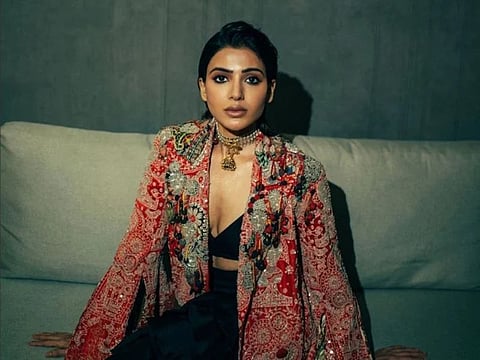Lakshmi Manchu slams Indian cinema’s bias: How divorced women like Samantha Ruth Prabhu are punished for agency
It was a rare moment of candour in an industry that often buries its sexism under glamour

Dubai: When Telugu actress Samantha Ruth Prabhu and actor Naga Chaitanya announced their divorce in 2021, the spotlight immediately turned not to his career trajectory, but to hers.
She was suddenly branded as “out of work,” her scripts quietly withdrawn, her star power questioned. This week, actress Lakshmi Manchu—never one to mince words—dropped a truth bomb during promotions for her new film Daksha: A Deadly Conspiracy.
“There is a superstar’s ex-wife who works here,” she said in an interview. “She got divorced, and since then, even films that were once offered to her have been taken away. Oddu le amma, aina emana antaru emo (He might feel bad and say something), is what they tell her. She is waiting to do good work.”
The reporter tried to press her on whether she meant Samantha. Lakshmi shot back: “You’re thinking it’s Samantha. There’s not one superstar; around five to six of them have been divorced. And I am close to all of them. But my point is, a man will face something like that; his life will never change. But for a woman…it’s different. No one gives us freedom; we have to take it on our own.”
It was a rare moment of candour in an industry that usually buries its sexism under glamour. Lakshmi said aloud what many insiders whisper: women who step outside the script written for them—be it divorce, refusing a certain kind of role, or simply speaking up—pay a steep professional price.
The Boys’ club at work?
In an earlier conversation, actress Parvathy Thiruvothu told me bluntly: “Any woman that displays any agency will see that the boys’ club will gather and penalise them through work.” She was speaking of the Malayalam industry, but her words could just as easily apply to Bollywood, Tollywood, or Kollywood. The mechanics are depressingly similar: projects vanish without explanation, casting directors suddenly “forget” to call, and producers mutter about “image issues.”
The men, meanwhile, emerge unscathed. Salman Khan, Aamir Khan, Hrithik Roshan—each has gone through divorces or high-profile breakups, but their careers barely stuttered. In fact, the narrative often frames them as eligible bachelors with renewed marketability. Divorce becomes a plot twist in their personal lives, not a career death sentence.
The double standards of image
For women, the industry still demands a veneer of purity. Marriages are marketed, pregnancies hidden until the last possible moment, and divorces whispered about like moral failings. The hypocrisy is staggering when you consider that Indian cinema regularly churns out so-called “women empowerment” films—yet the same industry punishes real women for exercising choice in their personal lives.
Samantha herself embodied this contradiction. She made a sensational debut in Hindi entertainment with The Family Man 2, delivering a performance that was widely praised. She lit up social media with her item song “Oo Antava” in Pushpa. Yet post-divorce, the narrative around her shifted from “superstar” to “struggling actress.” The subtext? She had dared to walk away from a marriage linked to an influential family, and she was paying for it.
What Lakshmi Manchu Exposed
Lakshmi’s irritation at the reporter wasn’t just about Samantha—it was about a larger, systemic bias. By saying, “No one gives us freedom; we have to take it on our own,” she articulated the exhausting truth every actress knows. A divorced male actor is still a “hero.” A divorced actress is suddenly “difficult,” “unlucky,” or worse—“jobless.”
And this goes beyond gossip. Work is literally taken away. Opportunities vanish, not because of lack of talent, but because of whispered fears that powerful men might take offense. That “he might feel bad” is the invisible censorship shaping careers.
Why This Matters
It is easy to dismiss this as the inner politics of showbiz. But cinema is both mirror and moulder of society. When the most visible women in the country are punished for divorce, it reinforces stigma for millions of ordinary women. The message is clear: a man’s life goes on, a woman’s life stalls.
If Indian cinema wants to parade itself as progressive—celebrating empowerment in films and awards speeches—it must start with its own workplaces. Equal pay is one battle, but the right to live without professional penalties for personal choices is another, equally urgent one.
Breaking the Script
Lakshmi Manchu’s outburst and Parvathy Thiruvothu’s blunt assessment may sound like isolated voices, but together they form an indictment of an industry too comfortable in its misogyny. Until more insiders speak up, until casting decisions stop being shaped by patriarchy’s invisible hand, Indian cinema will continue to glorify women on-screen while punishing them off-screen.
Samantha Ruth Prabhu’s story—whether or not Lakshmi meant her—symbolises this hypocrisy. An actress at the top of her game suddenly boxed into irrelevance, not because of her talent but because she chose to leave a marriage. In a country obsessed with cinematic stories, this is one plotline we need to rewrite.
Sign up for the Daily Briefing
Get the latest news and updates straight to your inbox






